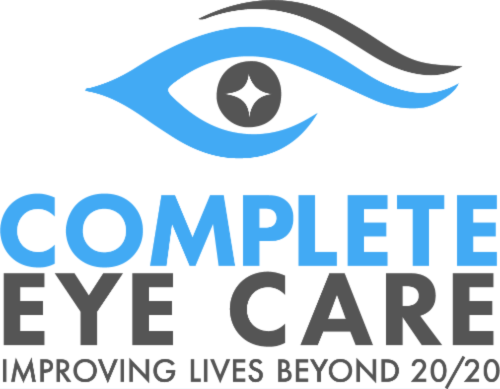
At Complete Eye Care’s Myopia Control Center, we go beyond traditional vision correction methods to help children slow down myopia progression and minimize their risk of future eye diseases.
Below, you’ll find valuable insights into the various treatments used for myopia management, ranging from Ortho-k to atropine drops, and multifocal lenses. By understanding these options, you can make informed decisions for the well-being of your child.
If you’re concerned about your child’s vision, contact the Myopia Control Center at Complete Eye Care today.
What is Myopia Management?
Myopia, commonly known as nearsightedness, typically develops during childhood and tends to worsen over time if left unaddressed. This condition is progressive, and the primary goal of myopia management is to slow it down in order to prevent other severe conditions like glaucoma, cataracts, retinal detachment, and macular degeneration that can be associated with high levels of nearsightedness.
Starting myopia management early, even for mild myopia, brings greater benefits and helps to safeguard your child’s long-term eye health.
Myopia Management Methods
1. Orthokeratology (Ortho-K)
Ortho-K is a non-surgical technique that uses specially designed contact lenses to reshape the cornea temporarily. By wearing these lenses overnight, Ortho-K gently reshapes the cornea, providing clear vision during the day without the need for glasses or contact lenses. Ortho-K has shown promising results in slowing down myopia progression, making it a popular choice for many.
Other names for Ortho-K include GVSS (gentle vision shaping system), corneal molding (CM), and corneal reshaping therapy (CRT).
2. Atropine eye drops
Atropine is a medication that dilates the pupil and temporarily relaxes the focusing mechanism of the eye. Low concentrations of atropine eye drops have been found to effectively slow down myopia progression with minimal side effects.
3. Multifocal lenses for myopia management
Multifocal contact lenses correct higher levels of myopia and are known to be very comfortable. They provide clear vision for both nearby and distant objects, eliminating the need to switch between glasses. The center of the contact lens enables the wearer to focus on distant objects that appear blurry to a nearsighted person, while the outer zone enables near objects to be seen more clearly.
Choosing the Right Myopia Treatment For Your Child
Here at Complete Eye Care’s Myopia Control Center, we understand the importance of making an informed decision that suits your child’s needs and lifestyle. To do that effectively, here are some helpful things to consider:
Age and Compliance
Children as young as eight can wear contact lenses, but successful myopia management relies on their compliance with the treatment plan. We educate both children and parents/guardians about the importance of following the prescribed regimen for optimal results. Our team will provide the necessary support to ensure your child’s commitment to their treatment.
Myopia progression
The severity of your child’s nearsightedness also plays a role in deciding the treatment method we would recommend. In some cases, corneal reshaping with Ortho-K may not be as effective for higher refractive levels. Consult with Dr. Barbara Marcussen or one of our other myopia experts to determine if Ortho-K is suitable for your child’s prescription.
Lifestyle Considerations
Consider your child’s lifestyle and activities when deciding on a treatment option. If your child loves outdoor play or finds glasses or contact lenses inconvenient in certain environments, Ortho-K might be a better choice. Ortho-K offers clear vision during the day without the need for corrective eyewear, providing convenience and freedom for active children.
Corrective Solutions
If you opt for traditional corrective options like glasses or contact lenses, incorporating atropine drops into the treatment plan can be beneficial. Atropine drops rarely have side effects and are well-suited for young children.
Still unsure about the best myopia treatment for your child? Schedule a consultation with Dr. Barbara Marcussen at Myopia Control Center At Complete Eye Care. Her expertise and personalized guidance will help you make a good decision.
Frequently Asked Questions (FAQs) on Myopia Management
Is myopia management worth it?
Absolutely. Myopia management is highly beneficial in slowing down the progression of myopia and reducing the associated risks.
By actively managing myopia, you can potentially prevent or delay the onset of serious eye conditions, ensuring better long-term eye health for your child. It’s a proactive approach that offers significant advantages and is surely worth considering.
Can myopia be treated without surgery?
Yes, myopia can be effectively managed without the need for surgery. There are various non-surgical treatment options available, such as orthokeratology (Ortho-K), atropine eye drops, and multifocal lenses. These methods have shown positive results in slowing down myopia progression and do not involve invasive procedures.
Consulting with an experienced eye care professional, like Dr. Barbara Marcussen at Complete Eye Care will help determine the most suitable non-surgical treatment for your child’s specific needs.
Get Advanced Myopia Management in Belmont, NC
By understanding the available myopia management treatments, you can protect your child’s vision and reduce future eye condition risks.
Contact the Myopia Control Center At Complete Eye Care today if you have concerns about your child’s worsening vision. Dr. Barbara Marcussen and her team are here to help you navigate the options and find the most suitable myopia treatment for your child.
